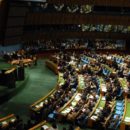"InfluenceMap's research confirms a widely held suspicion that Big Oil's glossy sustainability reports and shiny climate statements are all rhetoric and no action."
by Jessica Corbett
In the years since the 2015 Paris agreement, the world's top five Big Oil firms collectively have spent more than a billion dollars on "misleading" branding and lobbying to "capture the public and political narrative" on the climate crisis while they continue expanding their fossil fuel operations.
That's according to Big Oil's Real Agenda on Climate Change, a new report published late Thursday by InfluenceMap, a London-based nonprofit that tracks and analyzes how corporations influence climate policy.
Wrecking the planet is their business model https://t.co/y71ilaXa54
— Bill McKibben (@billmckibben) March 22, 2019
In December of 2015, world leaders came together in Paris and agreed to pursue policies to drive down planet-warming emissions in hopes of limiting global temperature rise to 1.5°C above pre-industrial levels by 2100.
Today, every country on Earth except the United States under the Trump administration supports the climate accord.
But major fossil fuel companies are actively working against systemic reforms—such as urgently phasing out fossil fuels on a global scale—that scientists say are necessary to meet the Paris target and avert climate catastrophe. Per the InfluenceMap report:
All five oil majors continue their efforts to capture the narrative on fossil fuels and climate, driven by coordinated messaging from corporate leadership on the need for increased fossil fuel production to meet global energy demand. Since Paris, Chevron, BP, and ExxonMobil have led in direct lobbying activities to oppose a range of progressive climate policy strands. Royal Dutch Shell and to some extent Total have made steps since 2015 to be more positive on a number of climate policy issues. However, both companies continue to support policy supporting a continued role for fossil fuels in the energy mix and remain part of highly climate-oppositional trade associations like the American Petroleum Institute.
"The most important part of this campaign activity is the nearly $200 million per year spent on lobbying designed to control, delay, or block binding climate-motivated policy," the report states. "This lobbying has hindered governments globally in their efforts to implement such policies post-Paris."
And while the companies certainly engage in such campaigning directly, InfluenceMap researchers found they also outsource "the most direct, negative, and egregious climate lobbying to trade groups such as the American Petroleum Institute which in 2018 successfully campaigned to deregulate oil and gas development, including a rollback of methane standards."
Big Oil's narrative capture effort, the report highlights, "accompanies the expansion of the companies' operations with combined annual sales of over $1 trillion and profits of $55 billion 2018, the vast majority of which is oil and gas related."
As Jan Erik Saugestad, CEO of the Norwegian investment firm Storebrand Asset Management, noted in a statement from InfluenceMap, "Remarkably, these five oil majors are forecast to put a mere three percent of their 2019 capital expenditure towards low carbon technologies whilst $110.4 billion will be put into more oil and gas."
"This is #Ecocide," British writer and environmental activist George Monbiot tweetedin response to the report. "In a just world, it would be treated as a crime against humanity—and against the rest of the living planet."
This is #Ecocide. In a just world, it would be treated as a crime against humanity - and against the rest of the living planet. https://t.co/lvdZBsmxUd
— GeorgeMonbiot (@GeorgeMonbiot) March 22, 2019
"These companies have mastered the art of corporate doublespeak—by boasting about their climate credentials while quietly using their lobbying firepower to sabotage the implementation of sensible climate policy and pouring millions into groups that engage in dirty lobbying on their behalf," ShareAction chief executive Catherine Howarth said in a statement.
As Howarth, whose London-based charity promotes responsible investment, concluded, "InfluenceMap's research confirms a widely held suspicion that Big Oil's glossy sustainability reports and shiny climate statements are all rhetoric and no action."
Shell and Chevron, in separate statements to the Guardian, rejected the report's findings. Shell, whose spending on climate branding last year was only topped by ExxonMobil, added, "We make no apology for talking to policymakers and regulators around the world to make our voice heard on crucial topics such as climate change and how to address it."
Originally appeared on Commondreams.org




 (909) 335-8100 ·
(909) 335-8100 ·  (909) 335-6777
(909) 335-6777 Email:
Email: